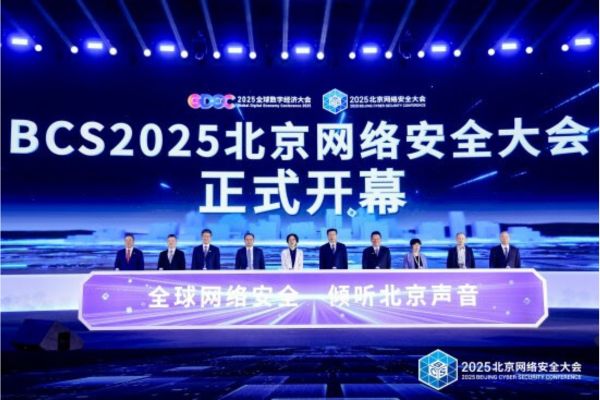On June 5, the Main Forum on Digital Security of the Global Digital Economy Conference 2025 (GDEC 2025), along with the 2025 Beijing Cyber Security Conference (BSC 2025), officially opened in Beijing. Under the theme “Security Breakthrough Reshaping Built-in Security Systems”, the conference brings together stakeholders from government, industry, academia, and research institutions to explore strategic breakthroughs for the cybersecurity industry in the age of artificial intelligence.
Xu Xinchao, Deputy Secretary-General of the Beijing Municipal People’s Government, stated in his speech that the construction of the Beijing National Cybersecurity Industrial Park has made phased progress. The Haidian Park, Tongzhou Park, and the Information Innovation Park in the Beijing Economic-Technological Development Area have together registered over 740 enterprises. The park has launched a national-level public cybersecurity service platform and has emerged as a leading national platform for China’s cybersecurity industry. Going forward, Beijing, as a hub for international scientific and technological innovation, will promote breakthroughs in core technologies, enhance digital security application capabilities, speed up the development of standards systems, and foster a vibrant industrial ecosystem, laying a solid security foundation for the healthy development of emerging industries, new business models, and innovative formats.
Qi Xiangdong, Vice Chairman of the All-China Federation of Industry and Commerce and Chairman of Qi-Anxin Group, emphasized that as intelligent agents and vertical AI applications proliferate rapidly, cybersecurity has reached a critical juncture requiring decisive breakthroughs. According to him, reshaping data aggregation models, security operations models, and ecosystem cooperation models are three major pathways for the security industry to reconstruct its framework and achieve transformation.
“Enhancement of AI capabilities does not equate to an improvement in security capabilities,” noted Zeng Yi, Dean of the Beijing Institute of AI Safety and Governance. He pointed out that AI security threats are becoming increasingly complex, evolving from basic threats to composite and sophisticated attacks.
Zhao Zhiguo, Executive Deputy Director of the Expert Advisory Committee of the Internet Society of China, remarked that artificial intelligence is not only a key technological domain in the global competition over cybersecurity but also a strategic asset in gaining the initiative in cyberspace. He called for a systematic approach to address complex risks and the construction of a more agile, intelligent, and collaborative security framework.
Participants at the conference underscored the importance of an ecosystem based on the principles of coexistence, mutual prosperity, and shared success, which plays a critical role in overcoming key technological challenges, promoting industrial synergy, and co-building the cybersecurity ecosystem. They expressed hope that the Beijing Cyber Security Conference would continue to serve as a platform to drive the modernization of the national cybersecurity system.
This year’s conference features cutting-edge technology forums, specialized competitions, international collaboration sessions, and, for the first time, a satellite venue in the Macao Special Administrative Region. Over a dozen sub-forums were held from June 5 to 6, covering topics such as smart energy security, data security, and AI large model application security.
















